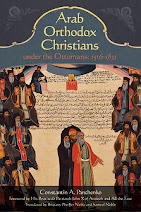Arabic original here.
The Cross in the Life of the Believer
The Lord said, "If anyone desires to come after Me, let him deny himself, and take up his cross daily, and follow Me" (Luke 9:23). In the original text, the verb "deny" is "ἀρνησάσθω" which literally means to renounce ownership of something, to disown something, or to give up a claim to ownership of something. In this sense, someone who wants to follow Christ must renounce himself completely and choose, with the fullness of his will, to surrender himself to Christ in order to be able to follow Him faithfully. Someone who wants to walk behind the Lord does not claim that his life belongs to him, but rather realizes that he owns nothing in itself and admits this. Following Christ is a constant, daily choice. It is the path of the cross, whose endpoint is the resurrection...
Why does the Lord say that whoever desires to follow Him must take up "his cross", in the sense that each person has his own cross? What do you think is the connection between our own cross and Christ's cross?
"If a man has committed a sin deserving of death, and he is put to death, and you hang him on a tree, his body shall not remain overnight on the tree, but you shall surely bury him that day, so that you do not defile the land which the Lord your God is giving you as an inheritance; for he who is hanged is accursed of God" (Deuteronomy 21:22-23).
In Jewish thinking, the cross or the tree is the cruelest punishment because someone who is sentenced to hang on the tree is "accursed" and "impure". That is, he is cast out and expelled from the Jewish people. The cross is the greatest shame for them. Christ knew His fate among His people "for Jews request a sign, and Greeks seek after wisdom; but we preach Christ crucified, to the Jews a stumbling block and to the Greeks foolishness, but to those who are called, both Jews and Greeks, Christ the power of God and the wisdom of God" (1 Corinthians 1:22-24).
The cross that Christ calls on us to bear is not connected to our sin and its impurity and shame. Rather, it is connected to bearing on our backs in love the impurity and shame of others. The Apostle Paul says, "God forbid that I should boast except in the cross of our Lord Jesus Christ, by whom the world has been crucified to me, and I to the world" (Galatians 6:14). The cross that I am called to bear is the one upon which I am crucified for the world just as Jesus was crucified for me. But in order for this cross of mine be for the love of Jesus Christ in man and creation, the world must be crucified within me first, through the cross of Christ. If the world has not died within me through the love of Christ, which He revealed to me on His cross-- that is, if the love of Jesus has not triumphed within me over every other love-- and thus if I have not arrived at the point of renouncing myself in complete obedience to the Lord, then I will not be able to be crucified for the world, because the crucified is one, the cross of salvation is one, and the Lord is one, "who Himself bore our sins in His own body on the tree, that we, having died to sins, might live for righteousness—by whose stripes you were healed" (1 Peter 2:24).
Alone with the crucified God-man, I enter into the crucifixion of my passion, the death of the old man, and my rebirth in the divine love that is in Christ Jesus, in His image, because "I have been crucified with Christ; it is no longer I who live, but Christ lives in me; and the life which I now live in the flesh I live by faith in the Son of God, who loved me and gave Himself for me" (Galatians 2:22). Faith in the resurrection is the foundation of salvation through bearing my cross which is in Christ. Because if the cross that I bear is not connected to Christ, it is a cross of shame and impurity on account of my sins and evil deeds and so it is not a cross of salvation since it is connected to my ego and not to my faith in Christ Jesus and my struggle for purification, my striving for enlightenment, and my longing for the vision of God.
My cross is my death to myself in my struggle for repentance so that I may become pure of heart and know my true self in the light of the divine grace that is in the Holy Spirit, through the Son from the Father. My cross is the struggle of prayer, fasting, charity, training to empty myself and position my soul, so that, when the Lord looks at my seriousness, perseverance, and sincerity, He will grant me new birth in Him through His cross. So my cross will become His cross and His cross my cross, because then I will say with the Apostle Paul, "For me to live is Christ and to die is gain."
Let him who is able to endure, endure.
+Antonios
Metropolitan of Zahleh, Baalbek and their Dependencies
The Cross in the Life of the Believer
The Lord said, "If anyone desires to come after Me, let him deny himself, and take up his cross daily, and follow Me" (Luke 9:23). In the original text, the verb "deny" is "ἀρνησάσθω" which literally means to renounce ownership of something, to disown something, or to give up a claim to ownership of something. In this sense, someone who wants to follow Christ must renounce himself completely and choose, with the fullness of his will, to surrender himself to Christ in order to be able to follow Him faithfully. Someone who wants to walk behind the Lord does not claim that his life belongs to him, but rather realizes that he owns nothing in itself and admits this. Following Christ is a constant, daily choice. It is the path of the cross, whose endpoint is the resurrection...
Why does the Lord say that whoever desires to follow Him must take up "his cross", in the sense that each person has his own cross? What do you think is the connection between our own cross and Christ's cross?
"If a man has committed a sin deserving of death, and he is put to death, and you hang him on a tree, his body shall not remain overnight on the tree, but you shall surely bury him that day, so that you do not defile the land which the Lord your God is giving you as an inheritance; for he who is hanged is accursed of God" (Deuteronomy 21:22-23).
In Jewish thinking, the cross or the tree is the cruelest punishment because someone who is sentenced to hang on the tree is "accursed" and "impure". That is, he is cast out and expelled from the Jewish people. The cross is the greatest shame for them. Christ knew His fate among His people "for Jews request a sign, and Greeks seek after wisdom; but we preach Christ crucified, to the Jews a stumbling block and to the Greeks foolishness, but to those who are called, both Jews and Greeks, Christ the power of God and the wisdom of God" (1 Corinthians 1:22-24).
The cross that Christ calls on us to bear is not connected to our sin and its impurity and shame. Rather, it is connected to bearing on our backs in love the impurity and shame of others. The Apostle Paul says, "God forbid that I should boast except in the cross of our Lord Jesus Christ, by whom the world has been crucified to me, and I to the world" (Galatians 6:14). The cross that I am called to bear is the one upon which I am crucified for the world just as Jesus was crucified for me. But in order for this cross of mine be for the love of Jesus Christ in man and creation, the world must be crucified within me first, through the cross of Christ. If the world has not died within me through the love of Christ, which He revealed to me on His cross-- that is, if the love of Jesus has not triumphed within me over every other love-- and thus if I have not arrived at the point of renouncing myself in complete obedience to the Lord, then I will not be able to be crucified for the world, because the crucified is one, the cross of salvation is one, and the Lord is one, "who Himself bore our sins in His own body on the tree, that we, having died to sins, might live for righteousness—by whose stripes you were healed" (1 Peter 2:24).
Alone with the crucified God-man, I enter into the crucifixion of my passion, the death of the old man, and my rebirth in the divine love that is in Christ Jesus, in His image, because "I have been crucified with Christ; it is no longer I who live, but Christ lives in me; and the life which I now live in the flesh I live by faith in the Son of God, who loved me and gave Himself for me" (Galatians 2:22). Faith in the resurrection is the foundation of salvation through bearing my cross which is in Christ. Because if the cross that I bear is not connected to Christ, it is a cross of shame and impurity on account of my sins and evil deeds and so it is not a cross of salvation since it is connected to my ego and not to my faith in Christ Jesus and my struggle for purification, my striving for enlightenment, and my longing for the vision of God.
My cross is my death to myself in my struggle for repentance so that I may become pure of heart and know my true self in the light of the divine grace that is in the Holy Spirit, through the Son from the Father. My cross is the struggle of prayer, fasting, charity, training to empty myself and position my soul, so that, when the Lord looks at my seriousness, perseverance, and sincerity, He will grant me new birth in Him through His cross. So my cross will become His cross and His cross my cross, because then I will say with the Apostle Paul, "For me to live is Christ and to die is gain."
Let him who is able to endure, endure.
+Antonios
Metropolitan of Zahleh, Baalbek and their Dependencies








No comments:
Post a Comment